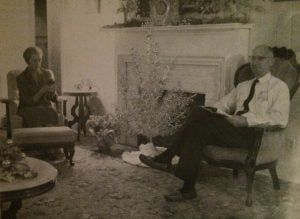Finding the Light

I just happen to have one of the most adorable (and smartest) 19 month old grandsons ever. Of course, I’ve probably mentioned that at least once . . . or twice. His name is Malcolm and at present his vocabulary is expanding on a daily basis. He’s added words such as elf, leaf, a ball, and lizard (at least his own versions thereof), but probably his most used word is his first one . . . “light”—or in Malcolmese, “ighhht”, with an emphasis on the t at the end. If there’s a light anywhere close by, he points to it and says “ighhht”. It can be on a Christmas tree, the cable tower that’s almost in our back yard, the ceiling fan . . . you name it and if it glows, he’ll find it and inform every one of its existence.
Lately, Malcolm has also become fascinated with lamps—I think because he knows they have the ability to become lights if someone will just let them. So when he walks into a room with an unlit lamp, he immediately points at it with the most distressed look on his face. But once you turn it on, the distress melts away, and you hear the familiar “ighhht”. Then he moves on to the next one, his mission accomplished for the moment.
His insistence on the presence of light was never more obvious than one evening when I was taking him downstairs to play while his mommy and daddy sat and visited with my husband. The stairway was well lit but the room below was dark, the most accessible light switch for it residing at the bottom of the stairs. About halfway down, little Malcolm stopped. He pointed into the darkness and, with the slightest hint of fear in his voice, said “ighhht.” Looking up at me, still pointing, he again insisted, “ighhht.” I explained the switch was at the foot of the stairs, but it didn’t matter. To this innocent child, the darkness needed to be banished. And that needed to happen before he continued his journey. It didn’t matter that there were toys. It didn’t matter that the room could soon be lit. There was only darkness then, and with that darkness came fear.
We all have those moments. Moments when we stare into the darkness, begging for the light but knowing our journey has not yet reached that point. For those who are grieving during this holiday season, that darkness may seem overwhelming and eternal. But there are some things you can do that may not flood your world with light, but which will at least allow you to find your way.
Given our current state of affairs, there probably aren’t many social gatherings right now, but if there are, nothing says you have to attend just because you’re invited. If you don’t feel like going, it’s perfectly all right for you to decline. If you don’t feel like decorating the whole world for Christmas, then don’t. If you think you should but you can’t bring yourself to tackle it all, choose a few special things and focus your efforts on them. And if the traditions are too burdensome, then change them. Every tradition was new at some point; perhaps this is the time to introduce something that allows you to make the holidays your own while still acknowledging the past.
Don’t be afraid to talk about the one you’re missing. Say their name, share their stories—don’t banish them from the celebration. That’s like the elephant in the room . . . just because no one talks about it doesn’t mean it isn’t there. It only means everyone will uncomfortably try to avoid it until someone acknowledges its presence. By including the one you’ve lost in your celebrations—whatever form they may take—you recognize the pain that comes with their absence, and that allows you to begin moving toward the light.
One of the last, and hardest, pieces of advice is one I have personally experienced. Find a way to focus on someone other than yourself. I don’t mean for the entire season, but perhaps just for a few moments scattered throughout. Send Christmas cards to folks you know are unable to celebrate with their families or perhaps folks who have no family left. Take a plate of cookies or a pie or cake (depending on your skill level) or even a casserole or a whole meal to someone who, for whatever reason, is suffering just as you are. Write letters to the people who have encouraged you over the years. Do something . . . anything . . . that will help someone else while taking your mind off of your own grief, even if just for a moment. And through it all remember, it’s fine to cry when the tears demand their freedom, and it’s fine to laugh if the occasion presents itself.
We all have lamps scattered about our lives, but those lamps are useless if we never turn them on. Even our little Malcolm has figured out that lamps don’t light themselves. But he values the light they give when we ask them to shine. Find the lamps of your life and light them whenever you can. Although they will not always be able to shine, those moments when they do will help see us through to the other side of grief.
About the author: Lisa Shackelford Thomas is a fourth generation member of a family that’s been in funeral service since 1926. She has been employed at Shackelford Funeral Directors in Savannah, Tennessee for over 40 years and currently serves as the manager there. Any opinions expressed here are hers and hers alone, and may or may not reflect the opinions of other Shackelford family members or staff.
The post Finding the Light appeared first on Shackelford Funeral Directors | Blog.












